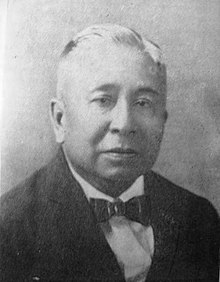Isabelo de los Reyes | |
|---|---|
 | |
| Honorary Bishop of the Philippine Independent Church | |
| In office 1929–1938 | |
| Senator of the Philippines from the 1st district | |
| In office 1922–1928 | |
| Preceded by | Vicente Singson Encarnacion |
| Succeeded by | Melecio Arranz |
| Member of the Manila Municipal Board | |
| In office 1912–1919 | |
| 2nd Vice Mayor of Manila | |
| In office August 7, 1907 – August 7, 1911 | |
| Mayor | Félix M. Roxas |
| Preceded by | Ramón J. Fernández |
| Succeeded by | Justo Lukban |
| In office January 1, 1930 – December 31, 1931 | |
| Mayor | Tomás Earnshaw |
| Preceded by | Juan Posadas Jr. |
| Succeeded by | Jorge B. Vargas |
| President of the Union Obrera Democratica | |
| In office 1902–1902 | |
| Succeeded by | Dominador Gómez |
| Personal details | |
| Born | Isabelo de los Reyes y Florentino July 7, 1864 Vigan, Ilocos Sur, Captaincy General of the Philippines |
| Died | October 10, 1938 (aged 74) Manila, Philippine Commonwealth |
| Resting place | María Clara Parish Church, Santa Cruz, Manila |
| Political party | Nacionalista |
| Other political affiliations | Republican |
| Spouse(s) | Josefa Sevilla María Ángeles López Montero María Lim |
| Children | 27, including Isabelo Jr. |
| Parents |
|
| Alma mater | Colegio de San Juan de Letran University of Santo Tomas |
| Occupation | Politician, labor leader, lay leader, theologian |
| Profession | Writer, journalist |
| Known for | Proclaiming the establishment of the Philippine Independent Church (Iglesia Filipina Independiente) |
| Nickname | Don Belong |
Isabelo de los Reyes Sr. y Florentino, also known as Don Belong (July 7, 1864 – October 10, 1938), was a prominent Filipino patriot, politician, writer, journalist, and labor activist in the 19th and 20th centuries. He was the original founder and proclaimer of the Iglesia Filipina Independiente, the first-ever Filipino independent Christian Church in history in the form of a nationalist church, which was proclaimed in 1902. He was also the founder and first president of the first-ever labor union federation in the Philippines, the Unión Obrera Democrática. He is popularly known today as the "Father of Philippine Folklore", the "Father of the Philippine Labor Movement",[1] and the "Father of Filipino Socialism".[2]
As a young man, de los Reyes followed his mother's footsteps by initially turning to writing as a career; his works were part of the 1887 Exposicion General de las Islas Filipinas in Madrid.[3]: 258 He later became a journalist, editor, and publisher in Manila, and was imprisoned in 1897 for revolutionary activities. He was deported to the Kingdom of Spain, where he was jailed for his activities until 1898. While living and working in Madrid, he was influenced by the writings of European socialists and Marxists.
Returning to the Philippines in 1901, de los Reyes founded the first modern trade union federation in the country in 1902. He also was active in seeking independence from the United States. After serving in the Philippine Senate in the 1920s, he settled into private life and religious writing. De los Reyes wrote on diverse topics in history, folklore, language, politics, and religion.[3]: 255 He had a total of 27 children with three successive wives from getting widowed each time; he survived all his wives.
- ^ Bragado, Erlinda (2002). ""Sukimátem": Isabelo de los Reyes Revisited" (PDF). Philippine Studies. 50 (1): 50–75. Retrieved February 20, 2019.
- ^ Cite error: The named reference
Saulowas invoked but never defined (see the help page). - ^ a b Cite error: The named reference
Mojareswas invoked but never defined (see the help page).